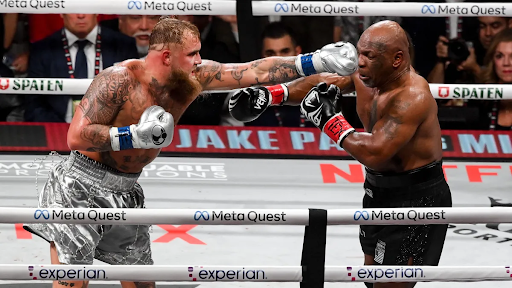Editor’s note: Spoilers for season three, four, and five of “You” ahead.
After eight years of stalking, marriage, and murder, the story of “You” finally comes to a close. Joe Goldberg (Penn Badgley) and Kate Galvin-Lockwood (Charlotte Richie) have cleared Goldberg’s name and moved back to where it all started: New York City. Galvin-Lockwood, having inherited all of her late father’s resources, uses them to get Goldberg’s son, Henry (Frankie DeMaio) back from where he had left them in at the end of season three.
To give a brief recap of how they get here, in season three, Goldberg killed his first wife, Love Quinn (Victoria Pedretti), after she attempted to kill him herself. He staged it as a murder-suicide, faking his own death and chasing his mistress to Europe. That leads into season four, where he ends up staying in London as a professor at Darcy College. There, he begins to get intertwined with a group of aristocratic, high-class Londoners who have more money than sense. Here is where his relationship with Galvin-Lockwood begins. As the season progresses, he discovers that he is being framed for a series of murders done by the “Eat The Rich Killer.” While the killer leads him on a merry chase, he ends up killing a politician named Rhys Montrose, who he had believed to be the one framing him. However, Goldberg discovers that he has actually been hallucinating Montrose the entire time due to his development of erotomania, a severe obsession with a famous person that makes the person think that they have a tangible relationship with the celebrity. The hallucinated Montrose was actually Goldberg the entire time, talking to himself and killing each victim himself. Not just in season four, but it is one of the biggest reveals of the entire series, as it shows how Goldberg was affected by the events of season three, causing him to literally separate that dark part of himself away and manifest it as a hallucination. Due to Montrose, Goldberg believes that the only way to escape is to end his own life, but he is saved by patrolmen. Galvin-Lockwood visits him in the hospital, and they promise to “keep each other good,” forgetting both of their dark pasts. These events lead us into season five, with them being one of the most rich and famous couples in the world.
In season five, despite his perfect life, Goldberg falls back into old habits. After three years of marriage, he craves the purpose that killing gave him, and when his wife resents him for it, he comes to the conclusion that she is not good enough for him anymore. He has an affair with his employee at the bookstore, Louise “Bronte” Flannery (Madeline Brewer), who makes it seem like she would accept his dark side. Another big twist: she is catfishing him to expose him for killing Guinivere Beck (Elizabeth Lail), whom he stalked and had a relationship with in the first season. She wants justice for her friend and teacher’s assistant.
According to Screen Rant, the critics have not treated season five with the same love as the others. While it has kept viewers engaged, the commonality of a show declining in quality as it approaches its final seasons is inescapable for many Netflix series. On Rotten Tomatoes, the show has a slightly precarious 81%, a decrease from the rest of the show’s running seasons. The show has a strong start with season one and two, with a score of 94% and 89%, and has slowly tapered off since season three. The season five score came in narrowly below the season four score, as stated in Screen Rant.
On social media, there has been plenty of mockery regarding the choices made in this season. Namely Flannery, who has been compared to Rumplestiltskin from “Shrek: Forever After,” and has been mocked for the way her character was acting. The character is a part of the “book tok” community, which is highly referred to as cringe-worthy on social media. Being treated this way is a common trend with “You” characters, especially from the male audience, because it is almost impossible for them to think Goldberg is justified if the woman is unattractive or unworthy to them. These audience members have said similar things about Marienne Bellamy (Tati Gabrielle) and Galving-Lockwood, both perfectly pretty women who should not be reduced to their looks. They also incorporated a significantly higher amount of slang in this season, such as words like “delulu,” “baddie,” “simping,” and the mention of “smut,” a term used for written intimacy scenes. These bits of the script are inconsistent with the rest of the show, considering in all the other seasons, Goldberg relentlessly made fun of new generations and was always characterized as a traditionalist.
The finale of the series was one of the best episodes by far. Badgley’s acting performance as Goldberg really brought a sense of fear to the audience, with scenes that are usually withheld to keep the audience from seeing how truly brutal he is. However, they did not hold back this time. With Goldberg in nothing but shorts, he’s reduced down to the savage and animalistic version of him that his victims see, not the romanticized version that’s curated for the audience. He gets caught by Flannery, who had been playing him the entire time. He goes to jail for life, and Flannery rewrites Beck’s book from the first season, without the additions Goldberg had added after he killed her.
The show ends with a self-reflection from Goldberg, him stating that “maybe the problem isn’t me, maybe, it was you.” His final act of self-justification is what puts the audience into perspective, showing how the media glorifying men like Goldberg only fuels them more and does not help fight off their internal justifications. It is a perfectly karmic ending for Goldberg, having no one and being forced to live with his actions until he dies.
Overall, responses have varied in relation to the ending of the show. Some believe that Goldberg would have thought his way out of getting captured, and some believe that this was justification for all the horrible things he did. In the end, romanticizing a character like Goldberg is what allows them to thrive within society, and breaking that mold is important for future women in dangerous situations. Capturing Goldberg was necessary, because he never would have been forced to face his actions unless he was removed from any way out.









Dallas Ryan • May 13, 2025 at 12:18 pm
YES. Ive been waiting for this article to come out omg